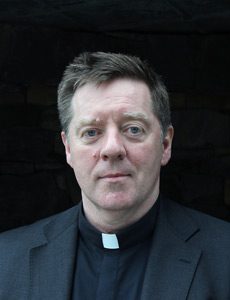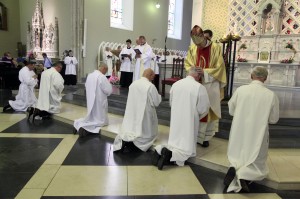
By Sean Ryan - 04 December, 2016

Bishop Francis Duffy
The Diocese of Ardagh and Clonmacnois has become the latest Irish Catholic diocese to announce its intention to ordain men for the permanent diaconate. This was announced along with an initiative to recruit parish catechists.
Announcing the initiative, Bishop Francis Duffy said in a statement: “The first pastoral initiative I wish to introduce is the ministry of Parish Catechist. Our teachers do excellent work in preparing young people for the sacraments and in faith formation. This is carried out in conjunction with parents and with parishes. To complement this work I now invite women and men from the 41 parishes of Ardagh and Clonmacnois to consider the ministry of Parish Catechist.”
Speaking about the role of parish catechists, he said that “The role of the Catechist is to work alongside parish clergy, in particular with parents of candidates for the sacraments of First Holy Communion, Confirmation and also in other programmes and initiatives that help people of all ages to deepen their faith.”
Following a two-year training period, the parish catechist will be commissioned to assist in a parish for a term of four years in this new voluntary role.
The course of training is also open to people who would like to deepen their knowledge of the Catholic faith and teachings of the Catholic Church without taking on a formal role of parish ministry. The course, which begins in autumn 2017, will take place in Longford in partnership with the Diocesan Pastoral Development Office, and will be offered by the Maryvale Institute, International Catholic College, Birmingham, England.
Meanwhile, Bishop Duffy has also announced his intention to set up a permanent diaconate in the diocese for the first time. He said that “Candidates for the Permanent Diaconate will have a good knowledge of the Gospel, a well-established spiritual life, and a proven willingness to serve others.”

Bishop Denis Nulty ordains seven new permanent deacons for Kildare and Leighlin. Pic: John McElroy (2013).
A restoration of the permanent diaconate was proposed at the Second Vatican Council. The role of a permanent deacon is distinct from that of a man who becomes a deacon as one of the final stages of his journey towards priesthood. It is described as follows on the Diocese of Limerick website, which quotes from the pamphlet ‘Among You as One Who Serves’ from the Irish Catholic Bishops’ Conference:
“Deacons are not supposed to be ‘mini-priests’, making up for a shortage of vocations. The Vatican Council was quite clear that, alongside the diaconate, the role of the ordained priest must continue to be fostered because without the priest there is no Eucharist and without the Eucharist there is no Church. Deacons are ordained to work alongside priests and lay ministers, not to replace them … Those who become deacons are ordained ‘not for the celebration of the Eucharist, but for service’.”
The role of a permanent deacon falls under three categories: Altar, Word and Charity. A deacon can serve in many ways. These include: assisting the priest at the celebration of the Eucharist; the formation of altar servers; the celebration of Baptism; presiding at funerals; proclaiming the Gospel; youth ministry; visiting the sick, bereaved and prisoners; and promoting awareness of the social teaching of the Church.
Bishop Duffy, in his announcement of his intentions for his own diocese, explained that: “The minimum age for admission to the Permanent Diaconate is twenty-five years for an unmarried man, and thirty-five years for a married candidate. The maximum age is sixty years. It will take four years to become a Permanent Deacon: a preliminary year, before he is accepted as a candidate, followed by three years of formation, in a part-time course, involving the study of theology and philosophy, as well as pastoral, spiritual and human formation.”
For more information on the permanent diaconate and the characteristics of a suitable candidate, see www.limerickdiocese.org/permanent-deaconate.html.